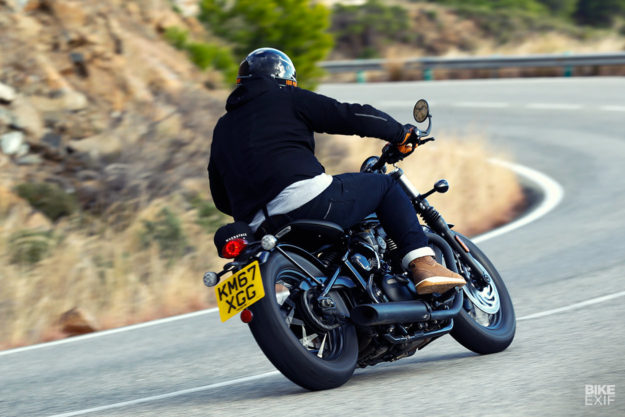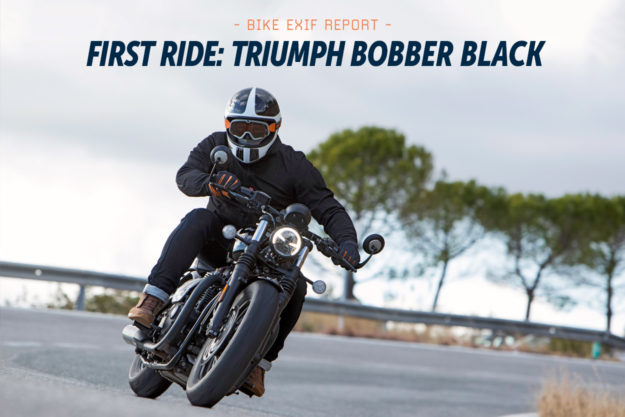
This time last year, I was in Madrid riding the then-new Triumph Bonneville Bobber. Fast forward twelve months, and I’ve just hopped off the follow-up Bobber Black, in Marbella on Spain’s Costa del Sol.
Madrid was a beautiful city, surrounded by incredible motorcycling country. But the riding between Marbella and Ronda is even better. In the same way, I loved the vanilla Bobber when I first rode it but the Bobber Black is just that little bit sweeter.
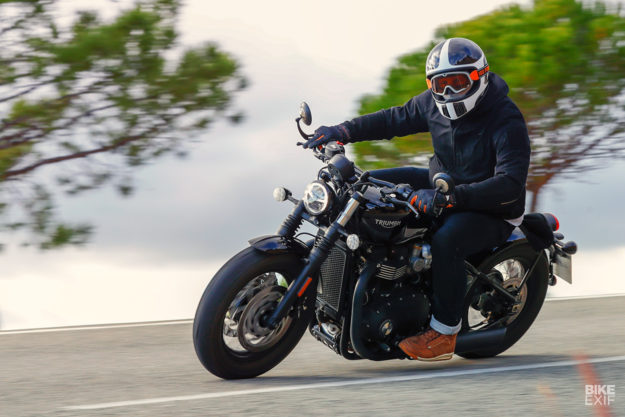
In basic terms, the Bobber Black is a murdered-out ‘standard’ Bobber with an upgraded front end. It gets a drop in front wheel size from 19” to 16”, beefier 47mm Showa forks (versus the original’s 41mm KYB units), and an extra brake disc with Brembo calipers.
Barring one or two other updates, it’s essentially the same bike. Same hardtail-look frame, same ‘high torque’ 1200cc motor, and the same solo rider setup. The price differs though; the Black costs a grand-and-a-quarter more than its sibling in the US.
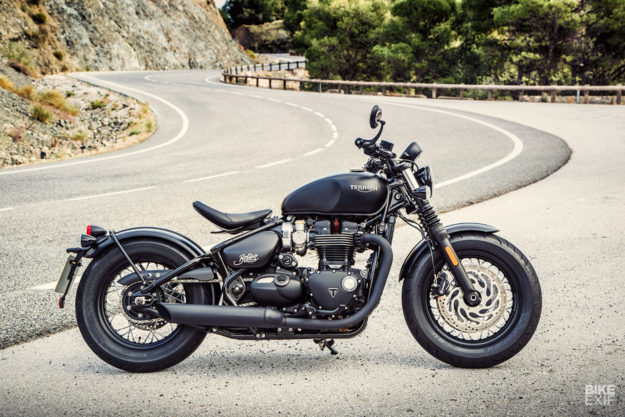
The first-gen Bobber was a runaway success—selling twice as fast as Triumph expected. It’s actually the fastest selling model in the 115-year history of the British marque: Not bad for a single-seater that caused half the internet to throw toys out of the cot over the idea of a factory ‘bobber.’
While all this was going on, the Bobber Black was patiently waiting in the wings. It was developed alongside the original Bobber and the idea, according to Triumph’s head of brand management, Miles Perkins, was to offer up more than one kind of Bob.
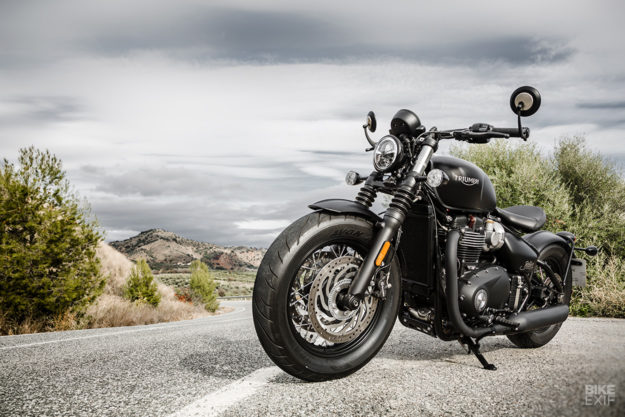
There’s the original flavor, for those after a classic vibe, and now the Black, for riders wanting a more aggressive stance and a higher spec.
So do the upgrades really make the Black that much better? Or did I hop a plane from Cape Town to Spain—and get snowbound in Amsterdam along the way—for nothing?
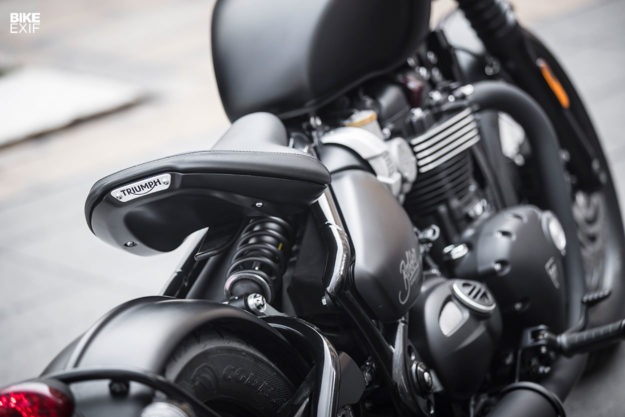
Before I hit the road with the Bobber Black, I had some time to take in the details. I’ve gushed previously about the Bobber’s sublime finishes and old school looks, and the way Triumph has managed to hide the modern technology. And on the Black, all of that still rings true.
That gorgeous swing cage and hidden mono-shock: check. A catalytic convertor that you can’t see: check. Faux carbs that are so pretty I can’t hate them: check. Classy ribbed fenders and a period-correct rear fender bracket: check.
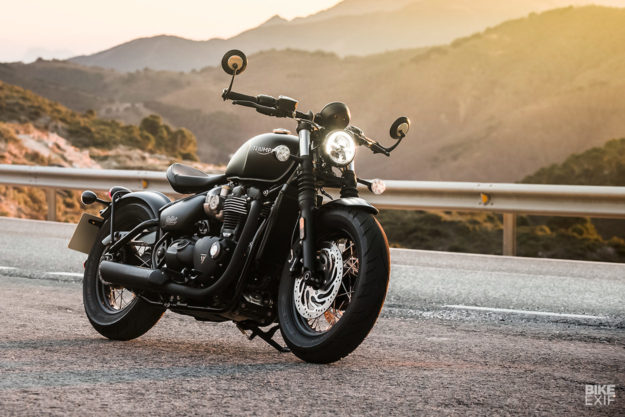
Except now, almost everything is—you guessed it—black. The engine covers, exhausts, handlebars, foot controls, levers, risers and wheels hubs have all been blacked-out. Heck, even the gearshift linkage and the aluminum seat pan have gone midnight.
A couple of parts have selectively been left alone, to add just the right amount of contrast. As for that cute 2.4-gallon tank and the fenders, you’ve got two choices: the base model jet black gloss (my favorite by far), or the slightly more costly matt jet black (below).
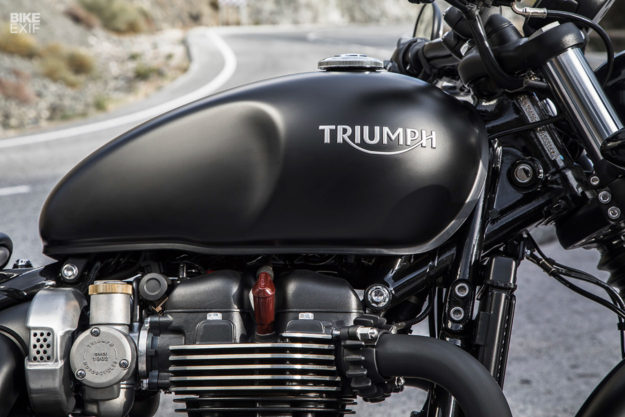
It’s the stance where the Bobber Black really differs visually from its fairer sibling, though. Even though the front rim is the same width on both bikes (2.5”), on the Black it’s smaller and wears wider rubber. Combine that with the chunkier forks, and you’ve got a bike that looks even more purposeful and muscular.
The rider ergonomics are also exactly the same as the Bobber’s, which caught me by surprise. I was convinced Triumph would add different handlebars or forward pegs, but they left the drag-style bars, mid-mounted pegs and solo seat exactly where they are. Which in retrospect makes a lot more sense, since the Bobber is actually a surprisingly comfortable ride.
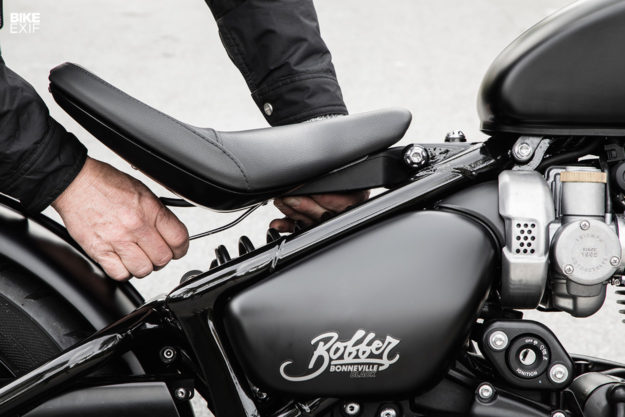
You can still adjust the cantilevered solo seat between up-and-forward and down-and-back, and you can still adjust the angle of the speedo to suit you. And I still wouldn’t bother with either adjustment—especially since I previously found the Bobber’s down-and-back seat position a bit too stretched out for my liking.
A look at the cockpit reveals a couple of new additions. There’s now an LED headlight to match the rest of the bike’s LED lighting, complete with a pretty daytime running light. And the left switchgear now includes a cruise control button.
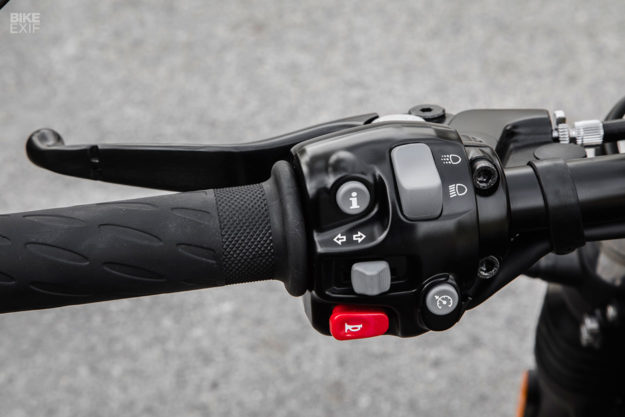
It’s a basic setup; hit the button to activate it, then hit it again to set your speed. Tap it once more—or grab the throttle or brake—and it’s off. The simplicity of it is great in theory, but I found that the button needed a really hard squeeze to work (my thick winter gloves probably didn’t help). I also missed the ability to adjust my speed while cruising that you’d find on most systems.
I’ve always loved the Bobber’s analog/digital combo speedo, and the amount of info that it packs in—including a fuel gauge, gear position indicator and consumption info. And the adjustable levers, slick bar-end mirrors and easy-to-use switches are all huge plusses—even if the switchgear housings are so darn big.
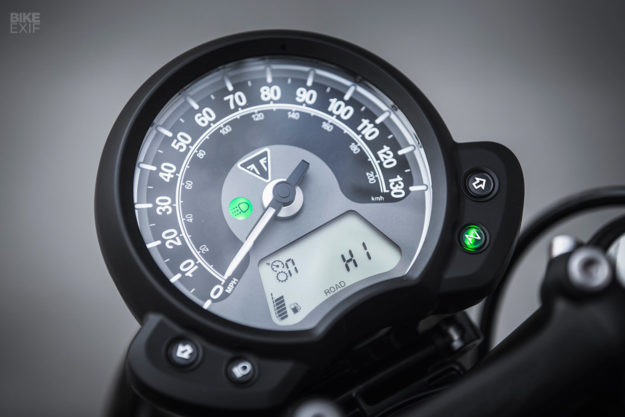
Our test units came fitted with optional heated grips, which worked a treat in the chilly Spanish hills. They also reveal how carefully Triumph has designed bolt-on parts: the button to toggle through different heating levels tucks up next to the existing switches like it belongs. And as you change modes, the speedo’s digital display feeds back the relevant info.
Firing up the Bobber Black reminded me of one of my favorite things about the Bobber—its engine. It’s the same liquid-cooled, 1200cc ‘high torque’ parallel twin found in the T120, with a 270 degree firing interval. But in the Bobber it has a unique intake and exhaust tune for even more gains.
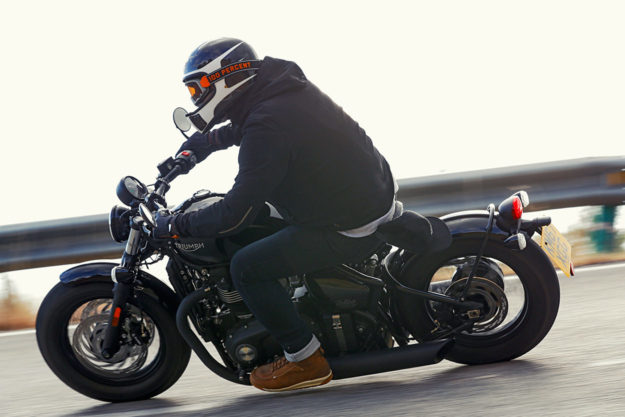
That’s a lot of words, but what it translates to in numbers is 106 Nm at 4,000 rpm, and 77 hp at 6,100 rpm. 77 doesn’t sound like a lot, but I tend to ignore arguments over numbers these days, preferring to focus on how well—and where—torque is delivered. And the Bobber does this sublimely.
As you spool the motor up to 4,000 you can feel—and hear—that peak torque kick in. Even though I’d love to hear the Bobber with the optional Vance & Hines cans, the stock setup delivers an addictive growl. More importantly, unleashing that torque makes shooting off the line or firing the Bobber out of corners an absolute pleasure.
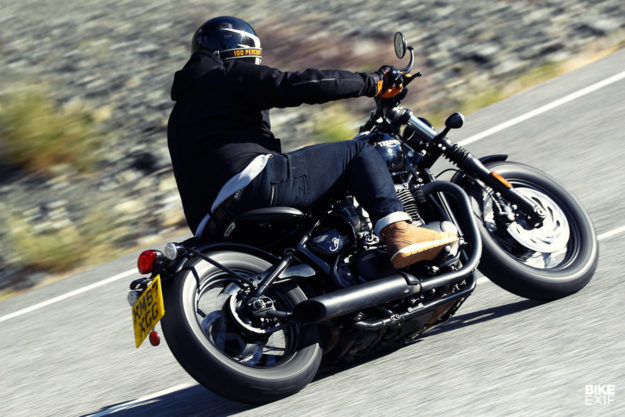
There is a lot of tech here for an ‘old-school’ bike, but I really can’t fault any of it. The ride-by-wire throttle is responsive, the torque-assist clutch is feather light and the ratios through the six-speed box are damn near perfect. (Oh yes, and it’s all Euro 4 compliant, with nary a sensor or box in sight.)
The rider aids also do little to detract from the Bobber’s retro feel. You don’t notice the traction control until you switch it off (which can only be done when stationary) and really abuse the throttle.
You can also flick between ‘Road’ and ‘Rain’ modes, which are both full power: ‘Rain’ just smooths out the delivery. ABS is standard, and behaved well during a couple of hard brake checks.
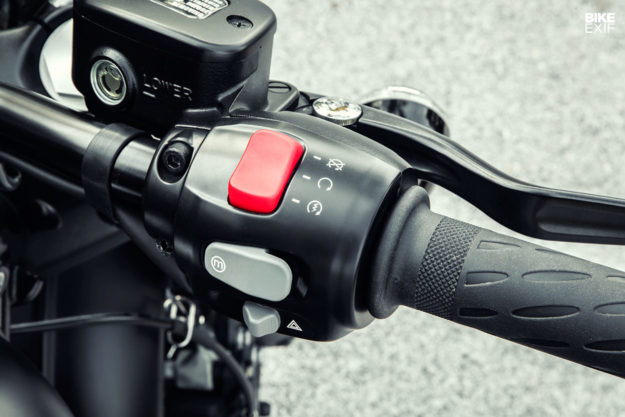
Our test route included countless hills and corners—and the new front end passed the test. The original Bobber is already a far better corner carver than it should be, thanks to Triumph’s exceptional chassis and suspension engineers.
The Black has exactly the same chassis, suspension travel and geometry as the base Bobber. But with that chubby front wheel and burlier forks, the Black really digs corners. It turns in quick and holds its line well, although it suffers from the same ground clearance woes as before. Kiss your pegs goodbye.
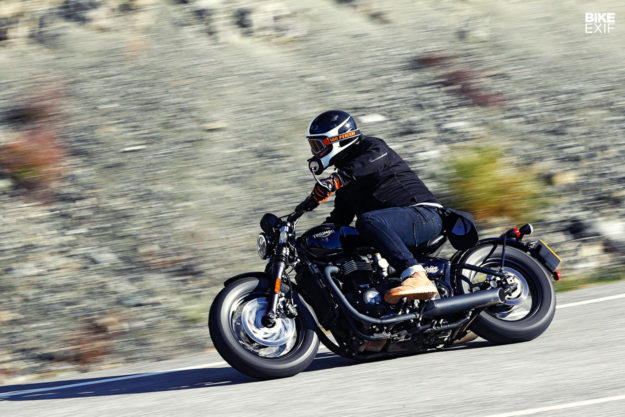
The Avon Cobra tires are grippy and predictable, and the 47mm Showa forks feel planted and precise. The overall suspension setup feels pretty stiff, which is great for hustling the bike through corners. But it did punish my back a bit on one particularly gnarly stretch of bad tarmac.
The twin Brembo brake setup is a massive improvement. I longed for more bite from the first Bobber’s single disc, and Triumph has now delivered. But it’s not just the raw stopping power on the Black that’s impressive: it’s the way I could shave speed off quickly with just a subtle squeeze of the lever. That upgrade alone is worth the price of admission.
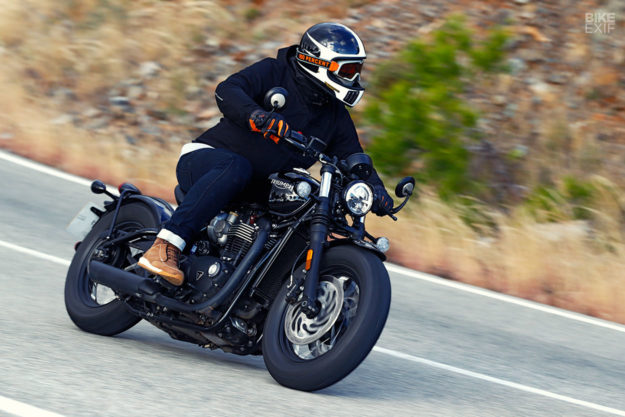
Our pace on the day was relaxed rather than rushed. But when things did get brisk, the Bobber Black was capable of more than we were throwing at it. And I marveled once again at how I could spend all day riding a bike with drag bars and a single seat. It might not be a tourer, but that seat hugs your butt well. So well, I could see myself tackling a few 200-mile days in a row, with nothing but a backpack.
Back in town, the Bobber Black transformed from back road blaster to urban runabout, with zero complaints. At 524 pounds (237 kilos) dry, it weighs 21 pounds more than the regular Bobber—but it’s content shuffling along at town pace.
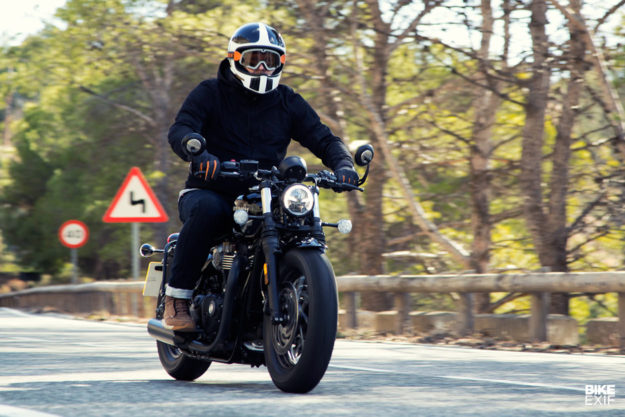
Last year, I signed off my review of the first-gen Bobber by saying you shouldn’t over-think it. And you shouldn’t over-think the Bobber Black either.
Like the original, it’s cool and it’s extremely well engineered. And although it’s single-minded it’s also remarkably versatile. But most importantly, it’s even more of a blast to ride.
And yes, I struggled to give the keys back.
The Bobber Black starts at $13,150 for jet black, and $13,400 for matt jet black in the USA. In the UK, those prices are £11,650 and £11,775.
Triumph Motorcycles | Facebook | Instagram | Images by Kingdom Creative
